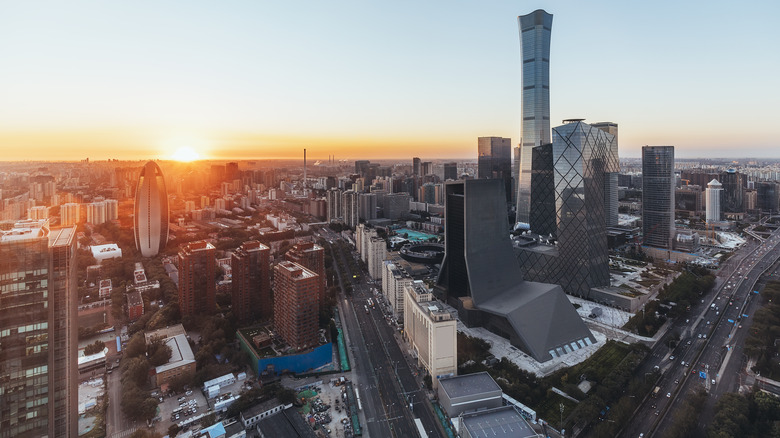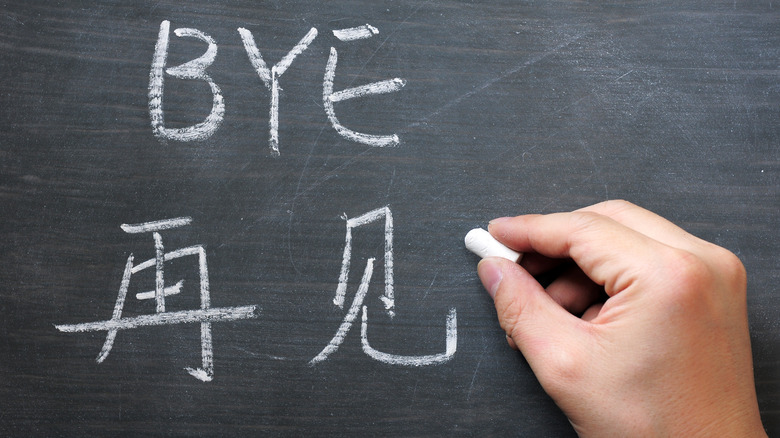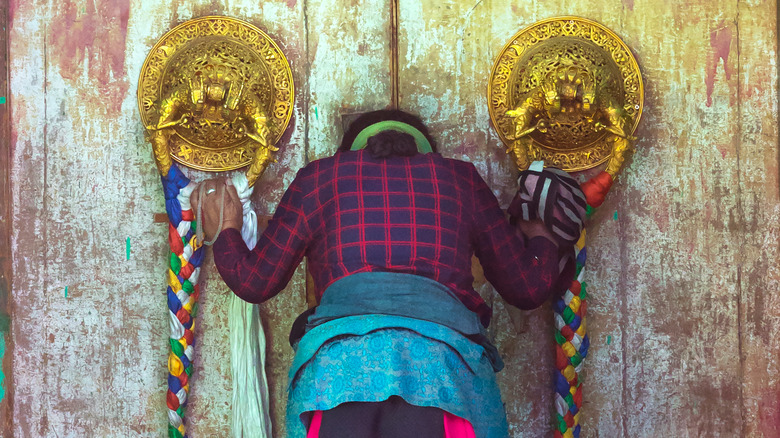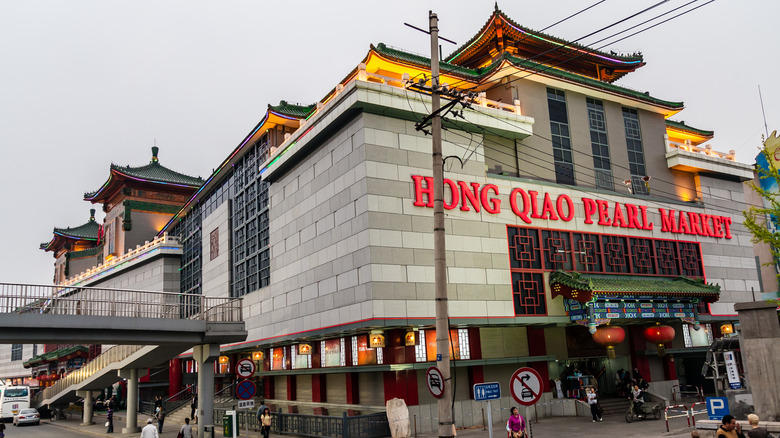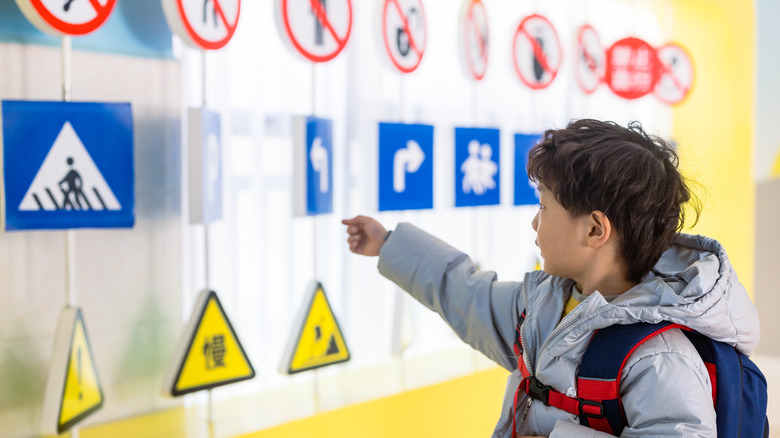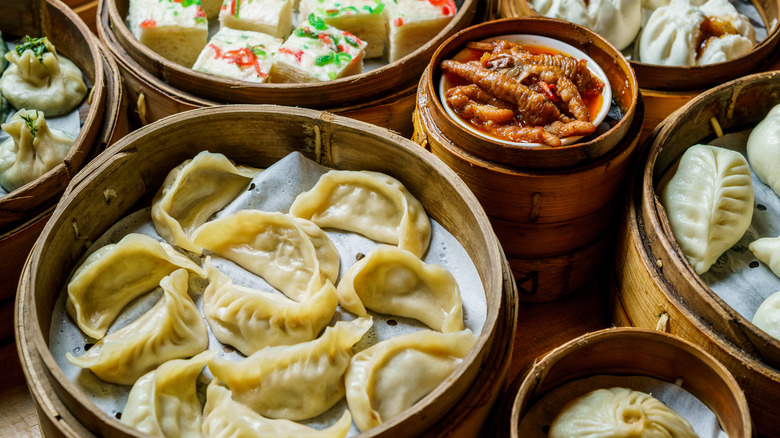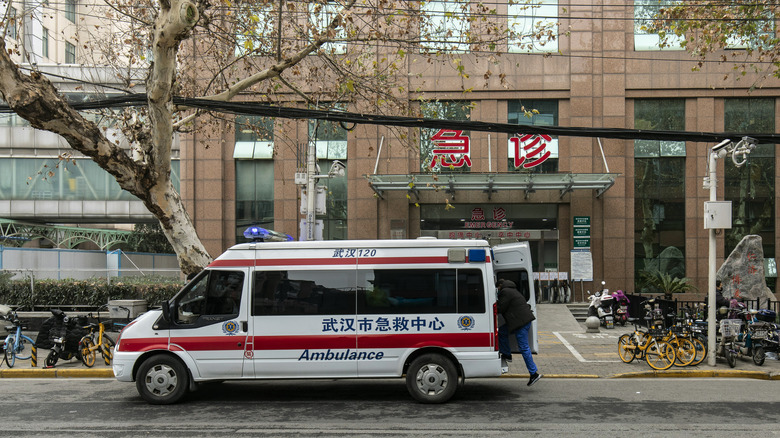Essential Words And Phrases To Know Before Your Trip To China
As a tourist, you'll mostly use Mandarin to communicate with folks in China. This Chinese dialect is the official state language and the most commonly used dialect in the country, particularly in cities like Beijing and Shanghai. Tourists generally go to the major cities, so opting to use Mandarin words or phrases will probably be the most helpful for you.
English-speaking tourists should be aware that Chinese citizens generally are not conversationally fluent in English. You're more likely to encounter English speakers in large cities or in tourist-heavy places like hotels, but less than 1% of the population has English fluency. So if you're planning on venturing out to more rural parts of the country or even less Westernized cities like Xi'an, you're going to want to know some Mandarin — or at the very least have a translation app at the ready.
We will use the simplified Hànzì (written form of Mandarin) throughout this piece too. Don't worry about memorizing how to write it out — we've included it so you can recognize the characters as you make your way through the country.
Basic greetings
Mandarin can be intimidating, but if there's only one word (besides "thank you") you learn before going to China, it's this: "hello," or "你好 / nǐ hǎo." This version of "hello" is the most common way to say it and is appropriate for most situations, including greeting strangers.
But when it comes to greeting people while you're in China, mainly if they are older than you or of a higher social or professional position, how you address them is important. Always remember that in China, as in many other countries, manners — even in speaking to stranger — is important. For situations like this, you should use the polite form of "hello," which is "您好 / nín hǎo."
If you're saying "hello" to a group of people, however, you'll need a different word altogether. In this case, you will need to say "hello, everyone," or "大家好 / dà jiā hǎo." This usage is far less likely for a casual tourist, but you never know when it might come in handy.
Basic farewells
Like with greetings, how you say farewell in Mandarin depends on the social situation. Generally, it's going to be fine to just say "goodbye," or "再见 / zài jiàn." Though you can get even more informal with the aptly translated "bye-bye," or "拜拜 / bái bái." Obviously, that's not how you're going to say goodbye to a person you need to be formal to, so maybe save the cutesy "bye-bye" for a friend rather than a stranger.
If you want to tell someone you'll see them later on, there are a few variations of that in Mandarin as well. You could say "see you later" — or "回头见 / huí tóu jiàn" — as well as "see you tomorrow," or "明天见 / míng tiān jiàn." Both of these are pretty neutral and appropriate for the majority of situations.
For a more formal social situation, you should use the firm "farewell," or "告别 / gào bié." You could use this when saying goodbye to an elder or someone that is professionally or socially higher ranked than you are. For something less formal but still polite you could say "I'll show myself out," or "留步 / liú bù."
Being polite
Aside from greetings and farewells, there are a lot of opportunities to be polite in your daily interactions in China. Courtesy, especially as a tourist, will get you a long way. Anytime you go somewhere with a different spoken language, one of the most important words you can learn is "thank you." In Mandarin that's "谢谢 / xièxie."
Equally, if not more important, is the word for "please." "请 / qǐng" is used in the same way "please" is used in English. So if you are asking for tea you can say "please" at the end of the sentence, or if you're telling someone they can take a seat you can say "please" at the top of the sentence.
Another common polite phrase is also a way of saying goodbye. If you tell someone to "walk/leave slowly" you are wishing them a safe journey home after meeting with them. In that case, you would say "慢走 / mànzǒu." Essentially you are telling the other person to "take care" as you part ways. This is usually appropriate regardless of the social situation.
Bargaining phrases
For shopping in China, mostly at markets or even some malls with stalls, bargaining is the name of the game. Chances are good that the shopkeeper will try to get more money out of you as a tourist — that's the name of their game, though you can try to negotiate even with limited language skills. One way to protect yourself from getting ripped off, though, is to be aware of item costs anytime you go shopping. That way you don't end up at the Pearl Market paying triple for a souvenir you could get at a discount shop down the street.
First things first, you'll want to ask the seller if they can do better on the listed price. You can ask them point blank: "Can you make it a little cheaper?" or "可以便宜一点儿吗 / Kěyǐ piányi yīdiǎnr ma?" They'll either give you an affirmative "是的 / Shì de," which is "yes," or "不 / Bù" for "no." You're more likely to get a cheaper price on something if you are shopping with a local vendor that's not in a major tourist stop like the Pearl Market or Snack Street.
If bargaining isn't working or you just change your mind, you can let the shopkeeper know you're no longer interested. Sometimes saying "I don't want it anymore," or "我不要了/ Wǒ bù yào le," might get you a better price than you could get before.
Asking questions
Chances are you will need to ask someone for something during your time in China. Even if you never end up needing to ask for help, it's nice to know how to! Regardless of what you ask, you will want to begin the conversation with "excuse me," or "不好意思 / bù hǎoyìsi." Starting the question off on the right foot will help you bridge the language and culture barrier with whomever you're talking to.
When you can't rely on good 'ol Google Maps as you can elsewhere in the world, you may need to ask for directions. Not forgetting to start with "excuse me," you can say to someone, "May I ask you for directions?" or "我可以向你問路嗎 / wǒ kěyǐ xiàng nǐ wèn lù ma?" With limited language skills, you may want to have an image of the place you're looking for or a translated version of the address to bridge the language barrier.
A few common locations you may need help finding include the "train station," or " 火车站 / huǒchē zhàn"; the "airport," or "机场 / jīchǎng"; and "public toilet," or "公共厕所 / gōnggòng cèsuǒ." As always, don't forget to ask for a toilet rather than a restroom or bathroom. Outside of the United States, most everyone refers to this location as a toilet, so it'll be less confusing.
Restaurant phrases
Particularly if you already love Chinese cuisine, dining in China will be heaven for you. The "restaurant" ("餐厅 / cān tīng") culture there is unbelievable. If you think you loved "dumplings" ("饺子 / Jiǎozi") before, prepare your tastebuds for the best you've ever had. Don't say we didn't warn you!
Anywhere you go you're likely to encounter "chopsticks," or "筷子 / kuài zi." If you need other kinds of utensils you will have to ask for them. To do that remember the words for "fork," or "叉子 / chā zi"; "knife," or "刀子 / dāo zi"; and "spoon," or "汤匙 / tāng chí." For the most part, these utensils are easy to remember because they all end in "zi" — with the exception of a spoon, which ends with a slight variation of "chí."
Chinese cuisine is also quite variable, which makes it excellent for a range of dietary needs. If you need to relay that you are a vegetarian, tell the staff "我吃素 / Wǒ chī sù." You can also tell them a more complicated dietary need by saying "I cannot eat," or "我不能吃 / Wǒ bùnéng chī." Consider writing these translations down if you have a specific dietary restriction so you don't end up having a reaction while abroad.
Emergency terms
No one likes to think about the worst happening, especially when you're on a fabulous adventure. Even so, whether you need emergency assistance for yourself or someone else, knowing a few emergency phrases could very well save a life — even if it's not your own. After all, you never know when an "emergency situation" ("紧急情况 / jĭnjí qíngkuàng") will come up!
Should you find yourself needing assistance, shout "help" — or "救命啊 / jiùmìng a" — very loudly. This will alert someone nearby to help. You could also shout "please help me" — or "请帮帮我 / qǐng bāng bāng wǒ" — though that's a more complicated phrase to try and remember. You may need to go to the "emergency room" ("急诊室 / jízhěn shì") or even report a "fire" by saying "这里有火灾 / zhèlǐ yǒu huǒzāi."
For less dire situations, you may just need to communicate that you aren't feeling well and need something. You may just need some "medicine" ("药品 / yàopǐn") or access to a "wheelchair" ("轮椅 / lúnyǐ"). Like in other scenarios with chronic situations — like dietary needs — consider writing down a translation of your medical condition to have with you at all times.
